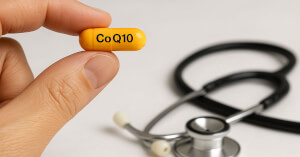
Coenzyme Q10 (CoQ10)
CoQ10 is an antioxidant that supports energy production in cells, promoting heart health and protecting against oxidative stress.
Coenzyme Q10 (CoQ10) is a compound naturally produced in the body and vital for energy production within cells. It also functions as a powerful antioxidant.
CoQ10 levels decline with age and certain medications like statins. It is especially important for heart and mitochondrial health.
CoQ10 is taken for cardiovascular support and energy. It is well tolerated with few side effects, though absorption may vary by formulation.
Other names & forms of Coenzyme Q10 (CoQ10) supplement : coq10, ubiquinone, coenzyme q, q10 supplement
Possible Benefits
Central to mitochondrial energy, Coenzyme Q10 (CoQ10) offers benefits for stamina, heart function, and cellular protection:
- Helps support Energy & Metabolism by improving cellular energy production and reducing fatigue.
- Supports Heart Health by enhancing myocardial bioenergetics and protecting cardiomyocytes from oxidative stress.
- Provides potent Anti-Aging effects by neutralizing free radicals in cellular membranes.
- May help maintain Cognitive Health by protecting neurons from mitochondrial dysfunction and oxidative damage.
Side Effects
CoQ10 (Ubiquinone) supports cellular energy production, but some users may notice mild effects as mitochondria adapt. Watch for:
- Possible gastrointestinal upset, nausea, diarrhea, or abdominal discomfort
- Occasional headache or dizziness in sensitive individuals
- Temporary mild insomnia if taken too late in the day
- Rare allergic skin reactions, rash or itching
- Minor transient elevations in liver enzymes at very high doses
Interactions
Possible interactions include:
- Statins and cholesterol drugs: CoQ10 can support statin users but may interact with Red Yeast Rice; discuss dose timing.
- Blood pressure medications: May improve endothelial function alongside ACE inhibitors; monitor blood pressure for synergy.
Precautions
Before adding CoQ10 to your routine, confirm none of the following apply to you. If they do, consult your healthcare provider:
- Individuals on anticoagulant medications (e.g., warfarin): CoQ10 can reduce efficacy; monitor INR closely
- People with low blood pressure: May cause further hypotension; monitor levels
- Those with liver disease: Use under supervision, possible enzyme alterations
- Pregnant or breastfeeding women: Limited data on high-dose safety; use under medical guidance
- Patients scheduled for surgery: Discontinue at least two weeks prior, possible anesthesia interactions
Studies
These studies provide scientific insights into Coenzyme Q10 (CoQ10) benefits:
A 2005 randomized, double-blind trial in 80 patients with congestive heart failure found CoQ₁₀ for 16 weeks improved left ventricular ejection fraction by 5 % versus placebo and reduced NT-proBNP levels.
A 2014 Q-Synergy meta-analysis of 14 RCTs concluded CoQ₁₀ lowers systolic blood pressure by 11 mmHg and diastolic by 7 mmHg versus placebo.
A 2013 double-blind trial in 60 migraine sufferers showed 150 mg/day CoQ₁₀ for 12 weeks reduced migraine frequency by 40 % versus 15 % with placebo .
A pilot crossover study in 24 athletes found 200 mg/day CoQ₁₀ for 4 weeks did not significantly alter VO₂max or time-to-exhaustion versus placebo .
Disclaimer: This page is for educational purposes and does not replace medical advice. If you're pregnant, have a condition, or take medication, speak with a qualified professional.










